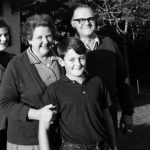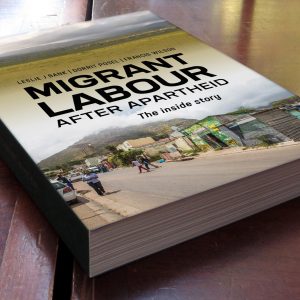Neil Aggett: The reckoning
Final arguments of the reopened inquest into the 1982 death of the trade unionist provide compelling reasons for his chief interrogators to be dealt their just punishment.
Author:
6 July 2021

Members of the apartheid Security Branch are responsible for the death of Neil Hudson Aggett. That is the case advocate Howard Varney made on behalf of Aggett’s family in his closing arguments to Judge Motsamai Makume on 2 July.
It remains to be seen if Makume decides that Aggett’s death at John Vorster Square Police Station on the morning of 5 February 1982 was an induced suicide, a result of the terrible pressure and increasingly brutal torture to which he was subjected during 70 days of detention. Or, if members of the Security Branch murdered him, staged the scene in his cell and manipulated evidence during the subsequent investigation into his death.
Either way, Varney and the Aggett family have made an exhaustive and comprehensive case for Makume to reverse the finding of the original 1982 inquest that no one was to blame for Aggett’s death.
Related article:
Lawyers representing the former Security Branch officers called to testify have said their clients cannot be held responsible for what might have happened in the 15 hours between the morning of 4 February, when Aggett complained of assault and torture to former police sergeant Aletta Blom, and the discovery of his body hanging from the bars of cell B16 at 1.30am on 5 February.
The majority of these officers were only involved with Aggett’s interrogation on 30 January 1982 and his main interrogators, Lieutenant Stephan Whitehead and Major Arthur Cronwright, have died. As far as their former colleagues are concerned, the blame for anything that might have driven Aggett to suicide or directly resulted in his death rests with the ghosts of his chief interrogators.
Makume faces an unenviable task. There are thousands of pages of court transcripts, from the original inquest and that heard over the past year. The records of the original investigation are patchy and lack adequate photographs of the crime scene and the autopsy. And there are the inevitable effects that the long time period between Aggett’s death and this inquest have had on the memories of witnesses and the availability of those still alive to testify.
Related article:
Varney again drew attention to the political interference by high-level members of the Thabo Mbeki administration in Truth and Reconciliation Commission (TRC) cases, which delayed the Aggett hearing. “The responsible institutions essentially sat on their hands and pretended that investigations were proceeding when they were not. We now know why the cases from our past have not seen the light of day in courts of law. It has emerged in recent court proceedings that powerful elements in society have shamefully colluded to ensure the suppression of all cases referred by the TRC to the NPA [National Prosecuting Authority].”
The consequences of those delays make Makume’s task immeasurably more difficult. With Whitehead and Cronwright dead, the Security Branch members who remain alive have shown they still believe that, in Varney’s words, they “have nothing to fear. This explains why, with a few notable exceptions, the former Security Branch witnesses have come before this court and continued with their charade of innocence, just as they did before the first inquest court in 1982. It’s as if nothing has changed. They do not have the slightest concern of having to face the music for their lies and deceit.”
In service to their country
Advocate Stephanus Coetzee unironically opened his submissions on behalf of Nicolaas Deetlefs, Roelof Venter and Martin Naude with a quote by Malcolm X: “You’re not supposed to be so blind with patriotism that you can’t face reality. Wrong is wrong, no matter who does it or says it.”
Coetzee would have Makume believe that while the former Security Branch members acknowledge that members of the apartheid security forces did terrible things in the service of their defence of the regime, it would be dangerous to punish them for the sins of the institution for which they worked. He warned of the importance of separating “fact from emotion” and “truth from speculation”.
Varney said “it is abundantly clear that the conduct of the [Security Branch] caused the death of Neil Aggett” and that “the evidence points unequivocally to an unrelenting and irrational campaign of vindictiveness and physical brutality directed against Aggett”.
Related article:
He offered two possible scenarios. In the first, Aggett committed suicide, pushed by “the cruelty of the police”. The Security Branch, “on their own versions, were aware or should have been aware that he was a suicide risk, but nonetheless took no reasonable steps to protect him”. In the second scenario, unknown members of the Security Branch murdered Aggett and then staged his hanging to cover up their crime.
Varney said there was enough “cogent evidence that points at the real possibility of foul play on the part of the police. This has much to do with what transpired in the hours leading up to his death and what transpired shortly thereafter. It also has much to do with the clumsy efforts of the police in covering up their conduct. This evidence points to the possibility that Aggett may have been murdered.”
The fictional four-pager
Former Security Branch members said during the original and reopened inquests that Aggett was pushed to suicide following revelations he made during the last period of the so-called long weekend of interrogation, from the morning of 28 January to the early hours of 31 January 1982.
These revelations were supposed to have implicated Aggett’s trade union comrades, Jan Theron and Oscar Mpetha, in involvement with the ANC. The guilt that Aggett suffered as a result of breaking and disclosing them to his captors was ultimately too much for him to bear.
The alleged damning confession was made to Deetlefs on 30 January. Deetlefs testified that he handed this confession to Whitehead and was present when they were allegedly compiled in a mysterious four-page document that was telexed from John Vorster Square to security police headquarters in Pretoria on 1 February.
Related article:
This revelatory document was not produced during the original inquest because of “national security interests”. It was not produced before Makume during this inquest, and Deetlefs was unable to recall its contents under cross-examination.
Neither could Deetlefs explain why, if these revelations had been so sensational and crucial to the state’s case, they did not lead to the arrests and detention of those Aggett allegedly implicated. Deetlefs’ only offering was that nothing had been pursued because of “a shortage of manpower”.
The Aggett family say the four-page confession is a fiction, used to help the Security Branch present a motive for Aggett’s suicide. It was “aimed at spoon-feeding the first inquest and securing a finding that “nobody was to blame”, said Varney.
Torture and perjury
Deetlefs, like all his former colleagues, maintained that he never used torture as one of his interrogation methods. He was a successful interrogator because of his ability to gain the trust and confidence of detainees by treating them well and making them feel at ease. Aggett’s breakthrough confession was thus supposedly evidence of Deetlefs’ superior soft-touch approach.
But as Varney said, “in their testimony before the first inquest, all the [Security Branch] officers adhered strictly to the same hymn sheet” in this inquest, “perhaps realising how obviously absurd their total denials of assault and torture must sound. [Security Branch officers] attempted to massage their evidence. Some claimed they only engaged in milder forms of abuse and soft versions of assault. Some conceded that they heard cries of detainees on the 10th floor. Some conceded others carried out torture but never themselves. All denied being present when torture was carried out. All denied involvement in serious assault and torture.”
He added that “all this evidence belongs firmly in the puerile category and all these witnesses have perjured themselves in giving such patently false evidence”.
Related article:
Deetlefs seems to have taken advantage of the reopened inquest to offer a piece of evidence in his defence, which he did not offer to the original inquest. He told Makume that he had been concerned for Aggett’s state of mind following his alleged revelations against his comrades and that he had told Whitehead and fellow interrogator Lieutenant Joseph Woensdrecht that he believed Aggett to be a suicide risk.
He claimed that he had made Cronwright aware of his concern and recommended that Aggett be taken to a psychiatric hospital for observation. Deetlefs added that on the morning of 1 February, when he last saw Aggett in Whitehead’s office, while the telex was being sent, Aggett had said in the presence of the two Security Branch officers that “he did not want to live anymore”, but Whitehead had not reacted.
Deetlefs claimed that he did not offer this information to the original inquest because he was pressured by Whitehead not to, for fear of its implications for his career prospects.
The arc of morality
This doesn’t do Deetlefs any favours as far as the Aggett family is concerned. Rather, it seems clear to them that because “Deetlefs very clearly foresaw the possibility that Aggett would take his own life, but reconciled himself to that possibility and failed to take reasonable and meaningful steps to avert it, even when he knew his own superiors were not acting”, Makume should recommend that he “be criminally investigated on a charge of murder based on dolus eventualis, with a view to his prosecution on this charge”.
Varney has also argued that Deetlefs be charged with perjury before the reopened inquest for advancing “false testimony under oath before this court on several issues relating to the treatment of detainees, knowing them to be false”.
He has recommended that similar charges for perjury be instituted against Woensdrecht and Venter, and fellow former Security Branch officers Johannes Visser, Daniel Swanepoel and Eddie Chauke. They all claimed they had no knowledge of torture being practised at John Vorster Square, never used any methods of torture in their interrogations and had no knowledge or saw no evidence of any torture carried out against Aggett.
Related article:
The Supreme Court of Appeal recently denied former security police officer João Rodrigues, a stay of prosecution for his involvement in the 1971 murder of activist Ahmed Timol, and the NPA has announced that it will establish a dedicated special unit to prosecute TRC-related cases. As such, Deetlefs and his fellow perpetrators may have reason to worry that this time around, the long arc of the moral universe may indeed be bending towards justice for the families of their victims.
Whether or not Makume will give that arc the push it needs is something the Aggett and many other families of apartheid victims wait expectantly to see.






